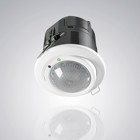Ex-Or announces addressable DALI system

Ex-Or by Honeywell has launched its DALI-in-a-Room addressable lighting control system.
Designed to give end users total control of their lighting by enhancing the lit space and lowering energy usage, it has been developed as an in-room solution that offers sophisticated addressable functionality without the usual complexity and maintenance issues often associated with other DALI systems.
Luminaires can be integrated within Ex-Or’s DALI-in-a-Room system to create up to 16 different programmable scenes. It offers end users across a diverse range of vertical sectors the opportunity to monitor and maintain light levels, improve working environments, make use of daylight harvesting, create different moods and enhance comfort conditions. With lighting being the second largest consumer of energy in a building, accounting for 19% of total expenditure, DALI-in-a-Room can help to cut that figure by up to 70% and yield a payback in less than one year.
DALI-in-a-Room is quick to install, as Ex-Or’s lighting control application technology is integrated within the passive infrared (PIR) sensor, making wiring easy and reducing the amount of hardware required. It provides up to 16 luminaire addresses via a 2-core network cable and three sensors per system can be fitted.







